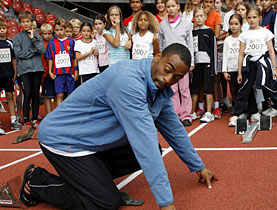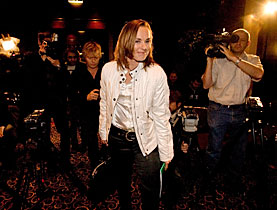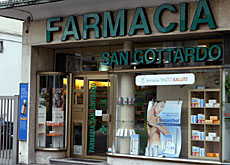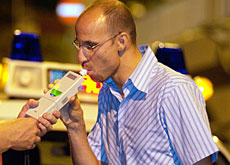Anti-doping agency gets go-ahead

Switzerland is determined to make up lost ground in the race to crack down on drugs in sport.
Swiss Olympic, the umbrella organisation for Swiss sport, has given the green light for a new independent anti-doping agency to start work on July 1.
It will be known as Antidoping Schweiz (ADS): Swiss Anti-Doping.
Until now responsibility for combating doping has been divided between Swiss Olympic and the Federal Sport Office.
“We owe it to young sportsmen and women to take the fight against doping seriously,” said former skiing champion Corinne Schmidhauser, who is to chair the ADS board.
Matthias Kamber, in charge of the anti-doping section of the Federal Sport Office, described the ADS as “a great step forward”.
However, the agency already faces financial constraints, operating on an annual budget of SFr3.8 million ($3.62 million), regarded as the minimum possible. Of this, 1.9 million will come from Swiss Olympic, and 1.7 million from the government.
The government has allocated an additional 300,000 to help the ADS get off the ground but it still faces a number of challenges.
Catching up
“We are taking this step only now, four years after the establishment of the World Anti-Doping Agency (Wada) and the introduction of the first anti-doping code,” Kamber told swissinfo.
The setting up of the ADS coincides with the coming into force of a second Wada code which will require new software.
“We are really being stretched. I can foresee huge problems,” he commented.
Switzerland, once a model in the anti-doping movement, has fallen behind most of its European neighbours.
In 2004 Kamber’s investigators caught two big fish: the former world cycling champion Oscar Camenzind and Olympic triathlon gold medallist Brigitte McMahon. But things are not the same today.
“We are no longer in demand as partners, not only as far as controls are concerned, but also in the matter of information, prevention and in international relations,” he lamented.
Kamber pointed out that in most European countries the state is much more closely involved in the anti-doping movement than it is in Switzerland.
He points in particular to the British experience, where the initiative for a new national anti-doping organisation came from the government. Its budget has been trebled in the space of two years to about £15 million (SFr31 million).
Looking for sponsors
Sport Minister Samuel Schmid has made it clear, however, that the Swiss government is not prepared to up its financial contribution to the ADS budget. He expects sponsors to step in instead.
„But those are the conditions we are obliged to accept,” Kamber said.
But Schmid’s hopes look like being well-founded. Marc-André Giger, the director of Swiss Olympic, announced that a private sponsor was ready to back the ADS with a “six-figure sum” over the next three years.
swissinfo, based on an article in German by Renat Künzle
In 2007 there were 1,419 doping controls in Switzerland, compared with 1,714 in 2005.
The ADS intends to carry out about 2,500 checks during competitions and training every year from 2009.
Since the establishment of the World Anti-Doping Agency seven years ago, the number of doping checks has risen from 120,000 to nearly 200,000 a year.

In compliance with the JTI standards
More: SWI swissinfo.ch certified by the Journalism Trust Initiative



You can find an overview of ongoing debates with our journalists here. Please join us!
If you want to start a conversation about a topic raised in this article or want to report factual errors, email us at english@swissinfo.ch.